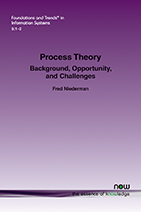Process Theory: Background, Opportunity, and Challenges
By Fred Niederman, St. Louis University, USA, fred.niederman@slu.edu
Abstract
The IS field has the opportunity to address a new range of questions and phenomena by expanding its attention to process. This monograph provides a taxonomy of various types of process based on level of agency by actors in initiating and carrying out the process as well as degree of adherence to action sequence planning. It also frames the discussion in terms of theory and the value of expanding the study of process in a theory representation and testing cycle. Numerous forays into process examination in IS are presented and critiqued. Discussions consider Process Virtualization Theory, Pentland’s path structure and process grammar ideas, and process mining. Roadblocks for scholars and editors interested in expanding the IS field’s use of process theory are also detailed with recommendations provided for addressing them. The monograph is intended primarily for IS doctoral students who have an interest in how and why computing by people works as it does.
Process Theory: Background, Opportunity, and Challenges
The purpose of Process Theory: Background, Opportunity, and Challenges is to promote the use of process theory as an essential part of the body of knowledge relative to information systems (IS) which should be nurtured and expanded. To do this, this monograph addresses why process theory is important, how it can potentially enhance the discipline, and what needs to be tackled to make the development and application of process theory routine and useful.
Process Theory: Background, Opportunity, and Challenges elaborates on the nature of theory, process, and their application to IS knowledge. While there is not an easy infrastructure for investing in this type of research and this monograph provides an initial piece around which the many pieces of infrastructure which are needed can be created. This monograph is aimed primarily at doctoral students, early career academics, and any other scholars who have not had a chance to focus on process as a component of their conceptual tool kit. It is intended to be helpful for those who intend to use process theory in their own research but also for those wishing to confidently review, promote, or just understand work in this area. It is hoped that this monograph will serve as a basis for invention of new process theory and new tools for creating, testing, and evaluating such theory.
